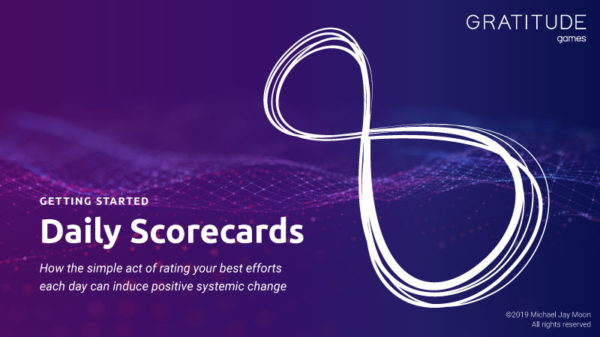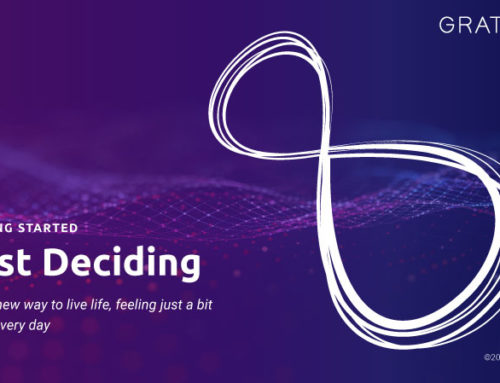How the simple act of rating your best efforts each day can induce positive systemic change, tap hidden energy, and start each morning with additional clarity and zest
By nature or habit, I am somewhat of a lazy person.
I much prefer getting things done with inspired zeal, surfing a wave of surging momentum, than just slogging through things.
Over the years I have experimented with lots of hacks, tricks, and systems, several of which I still use today.
A Daily Scorecard has emerged as one of the most elegant and effective ways of tricking my energy-mizer brain into playing a Gratitude Game.
Scorecards cue habits deep in our brains to pay attention.
Measuring what matters for each day
As students in school, we learned to take notes, read, and study for one aim: score well on the test.
Lots of experts have criticised this and offered more effective ways of learning a common core of knowledge and beyond.
However, the 12 to 20 or more years of education has left us with its deep imprint.
And Daily Scorecards can use that to our advantage.
When we know that we will later take a test of the subject of our studies, our brain activates an internal supervisor of sorts.
It signals our Cognitive Unconscious to invest its precious and hoarded energy in learning or working in a more focused and effective manner.
And we see this work everyday.
When the boss is around, we often feel compelled to look engaged in something important and meaningful to the business.
Of course, when the boss leaves, we feel relief and often justified to do something fun or not strictly “on task”.
Having a boss around cues our brains to focus on what the boss considers important.
So how can we use that?
A good Daily Scorecard will cue your Cognitive Unconscious to make meaningful progress towards stated goals, aspirations, and ideals.
For many people, making progress towards your goals comes down to projects, activities, and task completion.
And there’s a ton of tools and programs that promise to make you more productive and effective in managing your commitments, projects and time.
I personally use a method called Getting Things Done (GTD) by David Allen, and a software app called OmniFocus.
While GTD and OmniFocus are a great combination, like other personal productivity systems, they tend to overemphasize action and all but ignore how to get into action, what we might call getting ready.
Daily Scorecards can help with that.
The figure below depicts two parts of my Daily Scorecard.

End of Day Checklist
Each of 13 or so activities on this checklist represents the minimum effort that I expect of myself.

As the CEO of my life, I know that each of these activities contribute to my personal well-being and have told my “work staff” (me, myself and I) about these jobs to be done.
However, unlike the auto-habits of brushing my teeth or taking a shower, where I would feel weird NOT doing them, the 13 habits on my Workday Checklist still require effort … hence the daily prompt.
Notice how I used the past tense for the action verbs.
That’s a neurolinguistic hack by which to signal something important to your Cognitive Unconscious:
“Hey, this action is already done. So, stop resisting your getting it done. Your job is simple: come up with a narrative about how you did it with a minimum of effort”
Also notice the last four items, simple actions, that when completed, enable you finish your day “strong”.
I cannot overstate the importance of closing your day in a strong position.
With deliberate practice, finishing strong will become a superpower … a foundation of confidence, pre-energized momentum and the courage to take on even bigger challenges in the near future.
Self-mastery, first steps
The second part of the scorecard emphasizes a very humane way of self-mastery: Striving, but not always achieving, to do your best each day.
With this type of Scorecard I am programming my Cognitive Unconscious with baseline criteria for how I will score its performance.
Notice that each of these items represents something over which I have direct control … small actions that when “stacked” over the course of a day, can produce a stupendous lift.
Day after day, each time I score having done my best, I am reinforcing a story about myself, an “identity narrative” that establishes these 13 or so activities as the new normal.
Download your Starter Kit with an editable Daily Plan and Scorecard
Make it your own
After you download your Starter Kit, you will find an editable spreadsheet containing a Daily Plan as well as a stand-alone Day’s End Scorecard and Checklist (separate worksheets).




